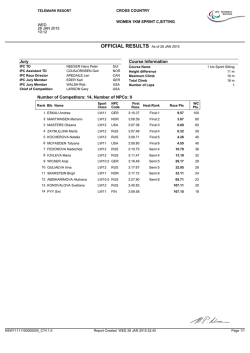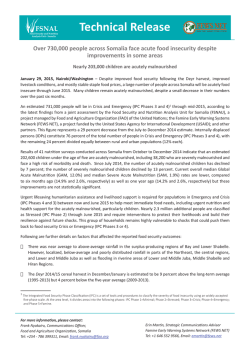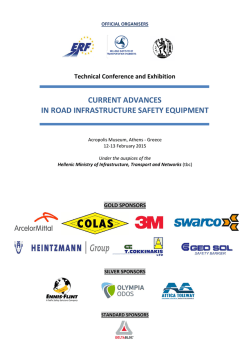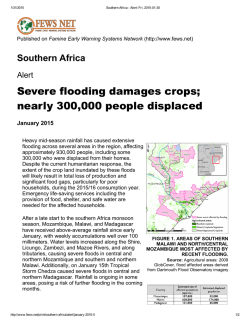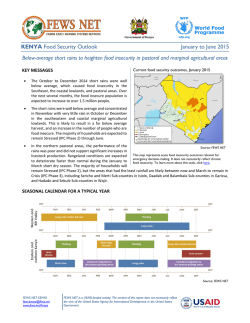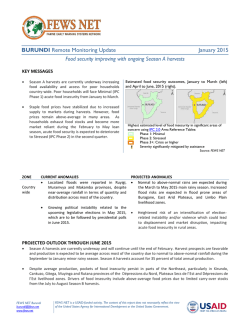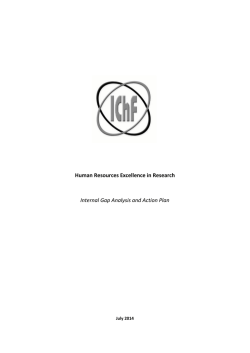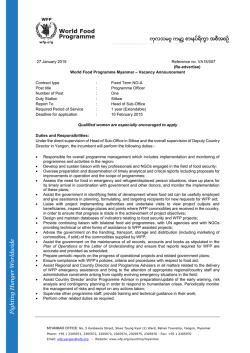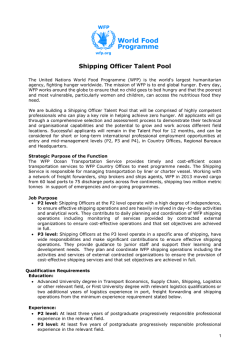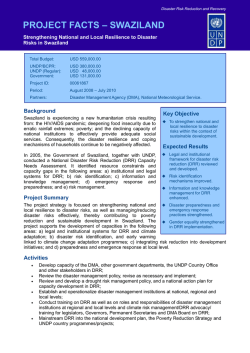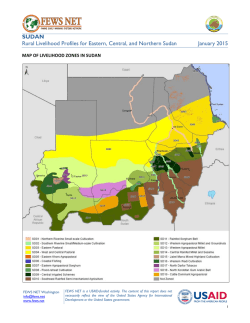
Food Security Newsletter (January 2015)
January 2015 For Period: October December 2014 Food Security Newsletter Inside this newsletter: Emergency Response Fund KP/FATA 2 ERF Monitoring Missions in 2 KP/FATA Recovery Need Assessment (RNA) for Flood Affected Areas 2014 2 Study on Livelihood and Food 3 Security of Returnees in FATA The Cash Working Group (CWG) Updates 3 Integrated Food Security Phase Classification (IPC) 4 Upcoming Events: FAO-WFP joint study for FATA returnees - Data analysis with draft report. Harmonized assessment for drought affected areas in Sindh and Balochistan. NTWG and PTWGs meetings at national and provincial level. National FS WG meeting National and provincial Cash Working Group meetings HCT - Strategic Planning 2015 for Food Security in KP/FATA Food Security Cluster has strategize the response for Temporarily Displaced Persons (TDPs) and Internally Displaced Persons (IDPs) of KP/ FATA for year 2015 and around 1.63 million people were planned as target caseload to improve and enhance nutrition status by increasing agriculture production as integral means of livelihood. Under the collaboration of food security cluster members, FSC has addressed the most urgent food security and livelihood needs of displaced, families living in and off camps and hosting areas of KP including Bannu, D.I Khan, Hangu, Kohat, Lakki Marwat, Nowshera, Peshawar, Tank and returnees in Khyber, Kurram, North Waziristan, Orakzai and South Waziristan agencies of FATA. Food Security Cluster has prioritized requirement need of around $ 173 million for providing the assistance in term of nutrition-balanced relief food rations, emergency livestock feed to protect their livelihood assets, medication, vegetable seeds, milking kits and agriculture based infrastructure in the areas of in and off camps and returns in KP/FATA. For effective monitoring of food security interventions, food security cluster has framed efficient and well coordinated monitoring framework under Strategic Response Plan (SRP) – 2015. Tharparkar Drought The arid zone areas of the Sindh province, is the most drought prone part of Pakistan. The current drought in Sindh is an integral part of an ongoing phenomenon resulting high impact in term of scale and intensity. In corollary, the loss of precious lives and mean’s livelihood affected the overall situation of food security among children, pregnant and lactating women and elderly Tharparkar - Children at risk inhabitant of drought affected districts of Sindh. In last year 2014, over 620 individuals were died; among them over 60% and 22% are children and women respectively, large population extremely vulnerable to disasters due to a myriad of factors, underlined by chronic poverty. On average, around 48% people of these areas are reliant on livestock and agriculture as primary means of income as reported in different assessments published in 2014 by food security cluster members. Prevailing situation and loss of income with depleting livelihoods increase the threat of food insecurity and malnutrition. Moreover, limited sources of safety nets result in people Tharparkar - Livestock as major source of livelihood adopting negative coping strategies. Access to clean drinking water, poor sanitation and hygiene awareness, exacerbates the situation causing high morbidity and mortality from water and vector borne diseases. Although, Government is providing the High Energy Biscuits (HEB) and wheat to affected population till December 2014. Page 2 Food Security Newsletter For Period: October - December 2014 Emergency Response Fund (ERF) - KP/FATA For North Waziristan displacement response, the Emergency Response Fund allocated initially US $ 300,000 to food security cluster, to support 2,733 affected families with livestock input in district Lakki Marwat and Karak by three implementing partners JEN, SHID and Muslim Aid. In which, Japan Emergency NGO will support 1,200 families at Lakki Marwat, SHID will support 930 families at Lakki Marwat and Muslim Aid will support 603 families at Karak with the awarded projects of ERF support displaced person (DPs) with livestock inputs including livestock feed and fodder , feeding and drinking kits, Urea Molasses Blocks (UMB), and mineral supplements for livestock. Additionally, the Food Security Cluster has further been given US $ 200,000 to support 1,154 displaced families at Togh Sarai camp in district Hungu. The project was awarded to SHID and the implementation is subject to approval of NoC from PDMA/PaRRSA. The assistance is aimed to support all camp based families with cash by involving them (males and females) in different vocational training activities and daily-wage work to rehabilitate camp infrastructure. ERF Monitoring Missions in KP/FATA carried a monitoring mission with ERF to Lakki Marwat and Karak. Lakki Marwat - Monitoring mission of JEN project for livestock assistance under ERF For the purpose of assessing the degree compliance and progress of the ERF funded project for NWA displaces persons, the Food Security Cluster jointly Japan Emergency NGO had already reached their initial 900 targets besides the coordination with district administration for allocation of more villages to identify and register additional 300 beneficiary families. Muslim Aid had completed their registration of beneficiaries while the inputs had arrived at their warehouse for distribution among the selected beneficiaries. SHID was still waiting for their NoC to be granted. At the latest, JEN and Muslim Aid had completed their targets while SHID has registered their beneficiaries after been granted with NoC. They’ve also received a No-Cost-Extension from ERF and would soon be distributing livestock inputs among the selected beneficiaries. Karak - Monitoring mission of Muslim Aid project for livestock assistance under ERF Recovery Need Assessment (RNA) for Flood Affected Areas 2014 Following Multi-sector Initial Rapid Assessment-2014 (MIRA), a multi-agency Recovery Need Assessment (RNA) was carried out by National Disaster Management Authority with the technical support from UNDP, FAO, WFP, ILO and UNHABITAT. Recovery Need Assessment covered 21 floods affected districts of Punjab and 5 districts of Azad Jammu and Kashmir (AJK). RNA relied on secondary data from various sources including MIRA -2014, satellite imageries and data from relevant government line departments. The assessment not only highlighted the utmost needs of affected communities for recovery and rehabilitation but also estimated the cost of recovery. In addition, RNA provided useful recommendations for resilience based recovery particularly in the domain of food security. These recommendations included diversification in livelihood portfolio, promotion of flood resistant crops, floods resilient infrastructure, participatory re-forestation and rangeland improvement and improved food storage. Multan - Damaged cotton crop due to floods 2014 Food Security Newsletter For Period: October - December 2014 Page 3 Study on Livelihood and Food Security of Returnees in FATA Kurram Agency - Livelihood activities of returnees To assess the early recovery needs of FATA returnees, FAO, WFP and IRC jointly conducting an assessment in six out of seven tribal agencies. Since the inception of complex emergency in KP and FATA, Food security cluster is providing food and livelihood support to the displaced households residing in and off- camp areas. It is estimated that over 2 million people have returned back to their areas of residence in past few years. The limited available information about the situation in areas of return except number of families that have returned and received assistance is due to security concerns. The assessment of returnees is designed to fill this information gap and to provide the necessary basis for effective and principled targeting of returnees and planning for durable solutions. Data collection through household interviews, key informant interviews and market assessment has been completed, whereas draft findings will be available in February 2015. Bajaur Agency - Returnees during day labor activities The Cash Working Group (CWG) Updates A 2-day training workshop on the “The Use of Cash Training in Disaster Risk Reduction” was organized in Karachi (19 -20 December 2014) and Islamabad (2627 December 2014) with the objective to “Enhance capacity of cash and DRR practitioners in planning and implementing cash-based interventions; mainstreamed with the Disaster Risk Reduction component”. Karachi - Group Photo (The Use of Cash Training in Disaster Risk Reduction) DRR can be a stand-alone activity particularly in preparedness planning and advocacy issues; however it is often an integral part of humanitarian interventions. The need for this training was realized considering the increase in cash-based programmes in Pakistan especially Cash for Work and Conditional Cash Grants, as well as Cash for Trainings. Planned with DRR considerations in mind, each of these modalities have the potential to build resilience of vulnerable communities living in hazard prone areas or vulnerable conditions, and increase their opportunities of pursuing sustainable livelihoods. 45 participants from International and Local NGOs, and Government departments (including staff from the National Disaster Management Authority, Agriculture, and Livestock department) attended the training. The trainers included; Mr. Falak Nawaz (WFP), Masooma Haider (FAO), Rabeea Ahmed (WFP), as well as Mr. Shuja Uddin and Mr. Mubushar Hus- sain (DRR Experts/Consultants) who were invited as Resource Persons for some specific topics; the link between disaster and development, and mainstreaming DRR in different sectors. Other than presentations, the two days training workshop also included group work, discussions, and sharing experiences from the field to make the event participatory and interesting. Karachi - Session on DRR (The Use of Cash Training in Disaster Risk Reduction) Page 4 Food Security Newsletter For Period: October - December 2014 Integrated Food Security Phase Classification (IPC) Year 2014 was the 10th anniversary year of IPC worldwide, where to respond to decision makers' call for a consensual, rigorous and comparable food security analysis, IPC acute food security analysis was carried out for Kharif cropping season from Oct-Dec 2014 in Pakistan by conducting 07 IPC analysis workshops over the country, where more than 300 food security experts have shared their knowledge to conduct IPC acute food security analysis at district level. The district level analysis of 148 districts over the country showed that IPC have very positive impact in periodic monitoring of the food security situation, while it also highlights that the everyday realities and challenges are also impacting on the food security at all levels especially at household level. Based on the technical feedback from the last analysis (Rabi Cropping Season - Mar - May 2014) and contribution of experts from government in data and information sharing has made the IPC analysis more rigorous in relation to its development and implementation. KPK - IPC Acute Food Security Analysis Workshop Following the IPC framework, based on the list of 20 indicators both from contributing factors including availability, access, utilization, vulnerability and stability, as well as on outcome factors including nutritional status, food consumption, livelihood change and mortality, food security situation in each district was ana- lyzed. Some districts were classified in phase 3 and 4 like Tor Garh in KP province, due to prevalence of high levels of poverty, remoteness and natural disasters. Sectarian conflict and low food consumption score are other important point of reference showing overall situation of food security presumably poor. Similarly, in few highly urban district Hyderabad was classified as moderately food insecure due to the rapid urbanization and the resulting loss of fertile agricultural land, the mass entry of residents from other districts leading to issues of crime. Most of the agencies and FRs were classified under phase 3 and 4 as the area is extremely poor and food insecure. According to the basic socio-economic indicators, i.e., literacy rate, income per capita, accessibility and health index, all FATA agencies are ranked at bottom 23 agencies of Pakistan with the lowest composite indicator. The growing insecurity due to insurgency, drone attacks and crews had negative effect not only on human lives but also on agriculture livelihoods, loss agriculture assets. In the districts of AJK and GB, withdrawal of subsidies will have a major effect in terms of price hike in the area. It will also have an impact on physical access of the wheat flour. In year 2014, IPC in Pakistan has developed its ownership among various stakeholders of districts, provincial and national level government departments including planning and development, agriculture and livestock, PDMAs and NDMA and important of all by the Ministry of National Food Security and Research. Furthermore need to establish increased, decentralized and sustainable IPC technical capacity at the national and sub-national levels identified to strengthen the relevance and rigor of IPC. Furthermore competent authorities, public sector organizations realized that IPC approach is not a standalone initiative; rather it ensures integration and capacity building to increase and ensure food security by factoring climate change, gender and resilience through IPC analysis into development and humanitarian programmes. IPC in Pakistan has moving ahead in 2015 with new challenges and initiatives like IPC Chronic Analysis, IPC Nutrition Piloting, IPC Cross country study visit for fertilization knowledge sharing, integration of IPC and its results in national food security framework/ strategy, creating synergies and building policy coherence, in order to increase impact on decision making. Food Security Newsletter Food and Agriculture Organization of the United Nations Food Security Co-lead NARC Premises, Park Road, Chak Shahzad, Islamabad. Mr. Fakhre Alam Khan - FAO ([email protected]), 0346-8544184 Mr. Zulfiquar Rao - WFP ([email protected]), 0300-8505295 Strengthening Humanitarian Response for Availability, Accessibility and Utilization of Food. Designed and edited by Saifa Asif (Assistant Cluster Coordinator) We’re on the Web! http://foodsecuritycluster.net/countries/pakistan https://pak.humanitarianresponse.info/
© Copyright 2026
